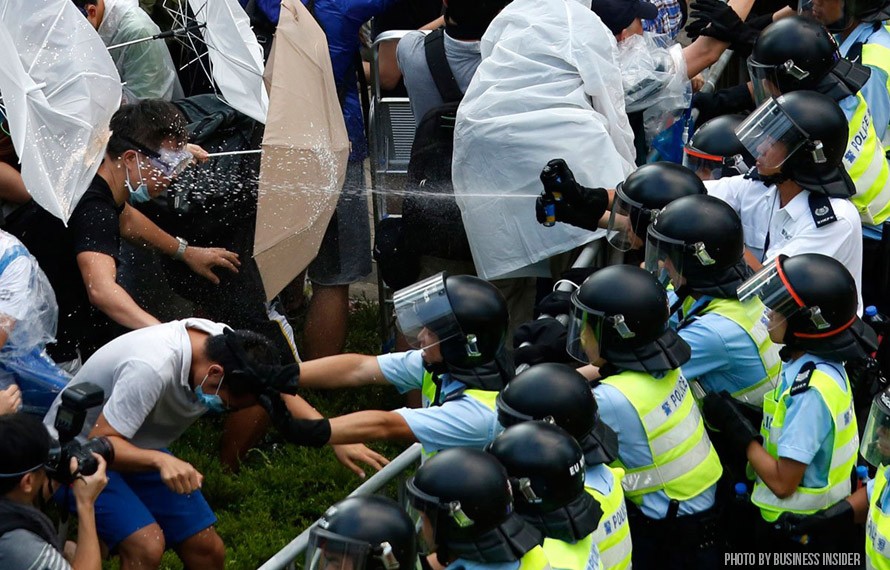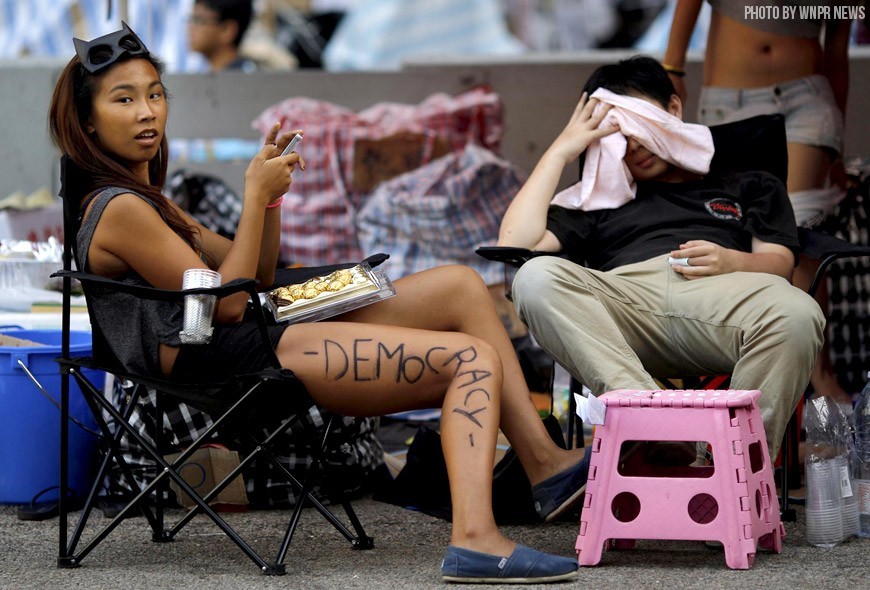In the early summer of 1989, Beijing students began to assemble. They sought democracy and aimed to achieve this unattainable concept from China’s Communist rulers. About 100 students staged a protest for democracy in Tiananmen Square in a peaceful hunger strike to protest for a more democratic government. This action drew thousands and eventually, Tiananmen Square became a highly contested place of 12 million protesters.
On July 4, 1989, Chinese military troops arrived in Tiananmen Square requiring media coverage of the protests to stop. In order to end the demonstrations by protesters, troops began firing into the crowd killing civilians and students. The official death toll of the massacre has never been released.
Today, students congregate in the streets of Hong Kong. The historical resonance is indisputable; thousands of students protesting for democracy as tear gas is fired on crowds and riots break out. With the eerie resemblance of Tiananmen Square in the background, students occupy the streets of Hong Kong leaving the government scrambling over their protest for democracy.
Millennials Protest for Democracy
Hong Kong is experiencing one of the largest flare-ups of civil unrest since Tiananmen Square as students flock the streets demanding a democratic election process. This turmoil stems from the historical hand over of Hong Kong and the empty promises of democracy from the Chinese government.
Hong Kong is an interesting place; located on Chinese communist ground, it is one of the most innovative and progressive places on earth. However, it is confined by the ancient constructs of communism that continue to hinder its modern thinking.
On July 1, 1997, after 150 years of British governance, Hong Kong officially became part of China under the Basic Law. This negotiated constitution, while ensuring many things, promised that democracy would eventually develop over a course of time.
In 2012, Leung Chun-ying beat out competitors to become chief executive, or head of the government in Hong Kong. Chief executive is a position of administrative power and served as representation of Hong Kong citizens during British rule. Unlike Presidents and Prime Ministers, the chief executive gives a corporation atmosphere impression as he is focused on the economic profits and success of the region. Chief Executive Leung, the unpopular choice among voters, was chosen by a large panel of officials to run for chief executive making this the last election controlled by a selective nominating committee.
As the 2017 elections grow closer, the Hong Kong government is going back on its word and trying to control the candidates once again running for chief executive. While citizens will be allowed to vote democratically, the government has announced that it will choose two to three candidates fit to run for office. Citizens have taken offense to this, and beginning on September 22, 2014, thousands of students became involved in the protests as they peacefully boycotted school and established a sit-in. However, these protests escalated quickly as a small group of students broke into government buildings and were arrested.
As the government releases tear gas on unarmed students, more civilians are compelled to join the democratic movement seeing these actions as over reactions to protesting.
Occupy Central Movement
As protesting escalates, so does its media coverage. Continuously, these protests are referred to as the Occupy Central Movement.
Organized by Benny Tai, Chan Kin-man, and Chu Yiu-ming, Occupy Central was born as a civil disobedience movement after Beijing’s ruling in August that two to three candidates will be selected by a committee to run in Hong Kong’s elections. The group announced that beginning on October 1, they would begin a mass, non-violent campaign to promote fully democratic elections in 2017.
17-year-old Activist
An involved participant in Occupy Central is 17-year-old student, Joshua Wong. Founder of the student group Scholarism, Wong is a critical component to these protests. Labeled an extremist, he has rallied pro-democracy students to fight for equal elections despite being a year shy of voting age. Alongside of Wong, many others continue to voice their opinions about democracy in the 2017 elections testing the established concepts of Communism.
Communist Constraints
As Communism bases it structure off collective benefits for the country as a whole, pro-democracy protests continue to threaten this structure with an outburst of individualism. If Hong Kong civilians are granted the right to choose the candidates of the 2017 elections, Hong Kong officials will have no control over the selected chief official and fear radical change.
Millennials continue to camp out in Hong Kong in search for their basic rights and representation of Hong Kong citizens in the government. As they continue to protest and the government condemns these actions, it is hard to ignore the possible repetition of history and looming violence as conflict escalates. Hong Kong’s Millennials protest for democracy is a continuation of a long fight for suffrage.



